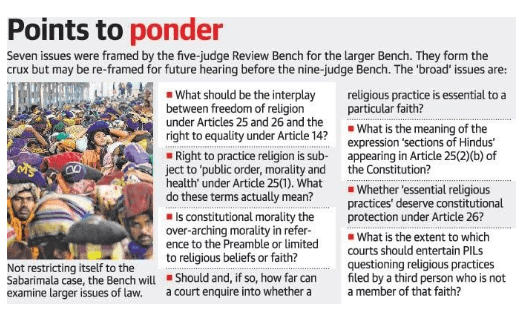UPSC Articles
Sabarimala case: Supreme Court not to review Sabarimala case, to examine ‘larger issues’
Part of: GS Prelims –Fundamental Rights and GS-II- secularism
In news:
- SC said its objective was not to review the Sabarimala women entry case but examine “larger issues” of law arising from practices such as the prohibition of women from entering mosques and temples, female genital mutilation among Dawoodi Bohras and the ban on Parsi women who married inter-faith from entering the fire temple.
From Mains point of view:

Daily Current Affairs IAS | UPSC Prelims and Mains Exam – 14th January 2020
From Prelims point of view:
ARTICLE 26 : FREEDOM TO MANAGE RELIGIOUS AFFAIRS
Subject to public order, morality and health, every religious denomination or any section thereof shall have the right—
- to establish and maintain institutions for religious and charitable purposes;
- to manage its own affairs in matters of religion;
- to own and acquire movable and immovable property; and
- to administer such property in accordance with
ARTICLE 14 : EQUALITY BEFORE LAW
The State shall not deny to any person equality before the law or the equal protection of the laws within the territory of India.
ARTICLE 25 : FREEDOM OF RELIGION
- The Article 25 states that every individual is “equally entitled to freedom of conscience” and has the right “to profess, practice and propagate religion” of one’s choice.
- Practicing religion or the act of propagating it should not, however, affect the “public order, morality and health.”
- The Article doesn’t put any restriction on the government when it comes to making any law to regulate “economic, financial, political or other secular” activities, which may be associated with religious practice.
- According to Article 25, the gates of Hindu religious institutions should be opened to every section of Hindus.
- Here the term ‘Hindus’ also includes individuals who profess Sikh, Jain or Buddhist religion. The same holds true for the term ‘Hindu religious institutions.











